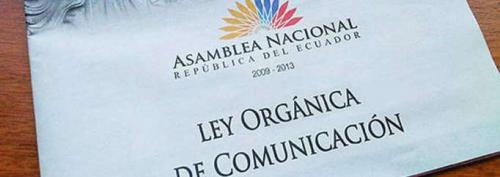In the dock
The Communications Law is an instrument that deserves to be protected and perfected, because it legitimizes the expression of citizenship and it follows the path of the democratization of communication.
- Opinión

Embraced by commercial concerns, freedom of expression tends to have its nature distorted in order to protect the concentration of property of the media and freedom of enterprise. This phenomenon is one of the factors that the Organic Law of Communication (LOC for its Spanish acronym) faces in Ecuador, alongside the risks of lessening the meanings of communication, as well as the traditional reduction of citizens to masses, through the dictatorship of rating.
With its focus on the right to communicate, the LOC sets out measures in the dimensions of access, participation and interchange of discourse, contemplating the validity of freedom of thought and expression as rights of citizens, as well as the right to information that brings with it rights and duties for communicators and journalists. Thus, communication is not only envisaged from the pole of emission, but also from the active space of reception, built on inclusive cultural policies and promotion of endogenous production. And the formula that materializes its anti-oligopolic essence is the equitable redistribution of the airwaves between community, commercial and public media.
Conservative groups are urging for the repeal of this law, arguing that it attacks freedom of expression. To the contrary, I am convinced that to rescind it would signify a regression of decades in the conceptualization and application of the paradigms of communication, as well as the rights of citizens.
The LOC reflects the fundamental international instruments that protect universal rights and professional guarantees of communication, such as prohibiting previous censorship and the right to confidentiality of sources. It also contemplates rights such as subsequent liability, respect for reputation and security. At the same time, it contemplates rights of citizens, such as those of reply and rectification, protection against discriminatory, violent or sexually explicit contents, the creation of an audience ombudsman and the functioning of observatories. In addition to these qualities, the LOC also has coercive powers that should be surmounted because they clash with its democratic spirit; we refer to the functioning of the Communications Superintendence that judges and sanctions; as well as article 16, that under the name of media lynching censors pluralism.
Moreover, the LOC needs to specify and / or incorporate elements that consolidate it within the framework of the democratization of communication, such as an approach of communication for good living, which would involve dialogue and convivial coexistence for sociocultural interaction in accordance with the Constitution of Montecristi[1]. This would go beyond the ethnicist understanding of interculturality and open it up to all kinds of otherness. It is necessary to encourage greater protagonism of journalists and their unions with their self-regulation mechanisms. It is necessary to contemplate a special and differentiated treatment for community media, respecting their nature of solidarity and their antisystemic character. Moreover, it is necessary to give greater prominence to the Communication Council, strengthening it with greater representation of citizens. Finally, the LOC should mention criteria on the role of social networks and not leave them navigating in the virtual sea of anomie by virtue of belonging to the field of freedom of expression and not to that of the right to information and communication.
The Organic Law of Communication of Ecuador (LOC) is an instrument that deserves to be protected and perfected, because it legitimizes the expression of citizenship, it puts in the dock the oligopoly powers and their tendency to a single discourse without social responsibility and it follows the path of the democratization of communication.
- Adalid Contreras Baspineiro, Bolivian communicologist, former General Secretary of the Andean Community – CAN.
22/03/2018.-
[1] TN: Adopted in Montecristi in 2008, the present Constitution of Ecuador was drawn up with widespread participation of citizens and is considered one of the most progressive in the world.
Del mismo autor
- La polarización en un mundo multipolar 06/04/2022
- Necesitamos estrategias de comunicación 19/01/2022
- Jaqin parlaña 24/11/2021
- Ciespal: espacio de encuentro continental de culturas comunicacionales 02/11/2021
- El diálogo político, eje de la integración 13/10/2021
- Los caminos de la integración en tiempos de pandemia 30/09/2021
- Paradigmas de retaguardia 15/09/2021
- Ciudadanía andina 19/08/2021
- La Chakana, espacio-tiempo de comunicación 03/08/2021
- Reducir la dimensión emocional de la información 08/06/2021
Clasificado en
Comunicación
- Jorge Majfud 29/03/2022
- Sergio Ferrari 21/03/2022
- Sergio Ferrari 21/03/2022
- Vijay Prashad 03/03/2022
- Anish R M 02/02/2022
